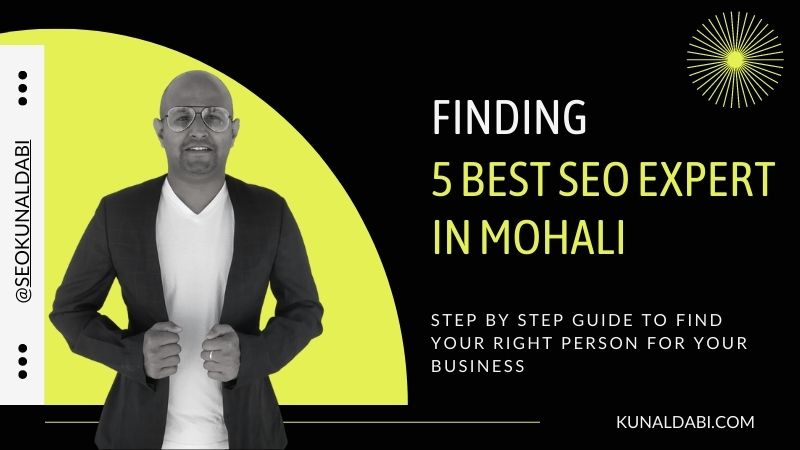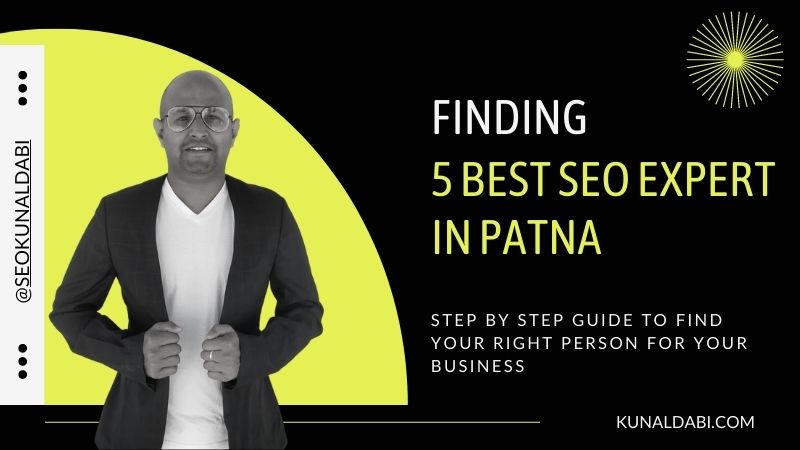SEO vs Google Ads: Which Is Better?
You’re not alone if you struggle to spread the word about your new business venture. Like you, many business owners and entrepreneurs initially have trouble acquiring customers.
However, balancing a marketing campaign’s maintenance, cost, and results is difficult.
It is common for marketers to solve this problem by using either Google Ads or Search Engine Optimization.
But which approach is suitable for your business?
In this blog Kunal Dabi, a leading Google Certified SEO Consultant) discuss what each approach is capable of helping you accomplish.
We have also outlined the advantages and disadvantages of Search Engines Optimization and Google Ads. So without further ado, let’s get started
Define Search Engine Optimization (SEO)
SEO is an acronym for search engine optimisation, which refers to the compilation of techniques or a set of practices that enhances the ranking and appearance of the website so that it appears higher on your favorite search engines’ SERPs (which stands for search engine results pages).
What Can You Expect From Search Engine Optimization (SEO)?
Only Selection Of Traffic Yeilding Keywords
SEO strategy chooses pertinent keywords for your website to ensure it ranks high in unerring search results. Google will influence your website’s ranking based on keywords you choose, so your SEO consultant will make sure you use pertinent keywords (in your website) to appear and rank in relevant searches.
Publishing only High Quality Of Content
Google always directs its users to those websites that contain first-rate content and provides all the information they require. An SEO-optimised website will only accommodate lengthy and informational content, hence its ranking tends to be higher in Google search results.
A Secured and Robust Website
In recent years, Google has noticed that Internet browsers are becoming increasingly concerned about the security and privacy of personal information, which is why SEO consultants will ensure to use SSL certificates that encrypt your website’s information. Google consistently ranks secure websites above non-secure ones.
A Good SEO Focus Only On User Experience
SEO peeps knows Bing and Google love it when you make your users happy.
SEO managers understand that an effective UX always makes your users or clients happy by making it easier for them to locate what they need. SEO will always help you improve your website’s UX, keep the navigation simple, include bullet points in your content, and insert engaging gifs, images, and videos.
Your Website Will Have High Mobile Compatibility
Due to the proliferation of mobile web browsing in the last few years, Google has pushed responsive design. The importance of responsive design lies in the fact that it allows your website to be viewed on mobile devices and tablets. Therefore, SEO will ensure a mobile-friendly website, which is crucial for ranking higher in search engines.
High Website Speed
Users need to get information quickly, so you won’t rank well if your website is slow to load.
A slow-loading website will increase the bounce rate, which lowers the ranking of your website. Therefore, SEO does a regular audit of the website to make sure you have a quick-loading website.
So, How does Search Engine Optimization Work?
Search Engine Optimization (SEO) is the upshot of search engines (Google & Bing). Each search engine has its unique algorithm and ranking factors that must be considered to rank high on search engine results pages. To thoroughly understand how Search Engine Optimization works, it is crucial to know how search engine ranking algo work.
Crawling
- Crawlers, also called spiders, are a group of robots(programs) used by Google search engines to discover web pages that are new or pre-existing.
- These crawlers (bots) sift through these web pages and follow the links mentioned to find new content that can be indexed. This is why external links and internal links are imperative in SEO.
Indexing
- Once the content has been crawled, it is indexed or published by Google; this is how online content is stored and organised.
- The index is a massive database of all pages that can potentially rank for a specific keyword.
- These relevant web pages or URLs are retrieved by crawlers when users seek information for particular topics.
Once the crawling and indexing of pages have been completed, search engines evaluate the pages according to their assumed ranking factors:
- Speed of the website
- Usage of keywords
- Is the website mobile friendly
- Backlink profile
- Domain Authority
Pros And Cons Of Search Engine Optimization (SEO)
| Pros | Cons |
| Investing in SEO and obtaining valuable rankings is more profitable in the long run than paying for Google ads. | Search Engine Optimization is time-consuming because many factors go into making your website appear on the first page of SERP, which is what keywords are used, how massive your website is, how new your domain is, etc. |
| Through SEO, you can provide people with what they want & when they need it without disturbing them. | Changes in algorithms lead to the loss of rankings. |
| It allows you to attract high-paying clients because they value the content you provide. | In an SEO project, results cannot be predicted. |
| SEO makes it possible to gain the trust and support of your audience in your industry, which makes you close every deal. | Practising black hat SEO can serve you a penalty by Google. |
| It allows you to attract the right target audience. | Results do not appear overnight. |
| Your website becomes a brand when it appears on the first page of Google SERP. | There is a possibility that your competitors will be more intelligent and aggressive than you. |
Google Ads: What are they?
Google Ads, earlier known as Google Adwords, is a form of pay-per-click advertising where a business or website owner pays (a certain amount) an ad publisher only when a visitor clicks on their advertisement.
PPC -Pay-per-click ads help captivate users primed to convert and fascinated by your offer.
The PPC method is primarily connected with search engines where business owners bid on relevant keywords based on their target market’s interests.
Generally, the cost of pay per click usually varies according to the industry you operate in and your keyword volume.
Types Of Google Ads
 Search ads
Search ads 
- Ads like these are displayed in text at the top of Google’s results pages, atop organic listings.
- These ads look like organic search results but have a tag AD next to them to distinguish between them and organic search results.
Google Shopping ads
- Ads like these are displayed as carousels atop search engine results pages, featuring images of various brands’ products.
- Users can also compare prices on these listings.
Local Services ads
- Ads like these belong to businesses like electricians and plumbers interested in attracting more local clients.
- These ads are also displayed in carousel format but contain (list) information about the business’s services.
Google Ads: how do they work?
Generally, Google ads function under the pay-per-click advertising model, in which advertisers bid on specific keywords. Whenever you place a bid, it will be a “maximum bid.”
Let us understand this with an example:
Suppose your maximum bid is $10, and Google calculates your CPC at $5; your ad will be displayed. In contrast, if Google calculates your CPC as more than $10, you won’t be able to display your ad.
Advertisers or Marketers usually have three options when it comes to bidding:
- Cost Per Mille. The amount you pay per 1000 impressions.
- Cost Per Click. The amount you pay every time a user clicks your ad.
- Cost Per Engagement. The amount you pay when a user clicks on your ad and takes a specific action.
After bidding, Google compares the amount with the Quality score. Quality score estimates your ads, keywords and landing page’s quality. More the quality score is, the higher will be the rank.
Your bid amount and quality score create your ad rank, which determines your ad’s position within search results.
Furthermore, when a visitor clicks on the advertisement, the marketer has to pay a certain amount to the publisher.
Pros And Cons Of Google Ads
| Advantage | Disadvantage |
| With Google Ads, you can generate instant results where you can track your sales, lead generation etc. | Your CPC can be expensive depending on several factorsAmount of your bidThe number of competitors biddingCompetitors’ bid amountsWhat time is itYour budget left for the day |
| Your ads are relevant and will reach the right target audience. | It can be cumbersome to those who are new to Google ads and do not have any prior experience. |
| You just have to pay only if someone has clicked your ads. | If you are out of budget, your ads won’t be displayed. |
| It helps you to remarket to those users who have already visited your website. | Your campaign’s audience cannot be segmented effectively. |
Google Ads vs SEO: What is The Difference
SEO gets you traffic organically, while Google ads are a more aggressive paid way of getting traffic. The ROI for SEO and Google ads is also different.
SEO, for me, is like building your digital empire by carefully putting each and every brick in the right place. Google ads, on the other hand, is renting other premises to show your address. Well, in my experience, I have seen seo bringing sustainable and consistent results over a period of time.
| Features | Google Ads | SEO |
| Clicking cost | You only pay when a user clicks on your ad. | Nothing is the cost when your listing is clicked. |
| Traffic | Generated during the campaign only. | Traffic is generated continuously. |
| Selection Of Keywords | Both short and long-tail keywords work here. | Both short and long-tail keywords work here. |
| Duration | Results can be generated fastly | Results take time. |
| Tracking | ROI and analytics are tracked immediately | It takes time to track ROI and analytics. |
| Placement | Ads can be placed on Google-owned websites (youtube, Gmail, nest, Waze etc.) in addition to search results; | It only appears in search results |
Does Google Ads boost SEO?
Yes, certainly it does.
The answer to the above question will be more clear to you after reading the other benefits of Google ads in SEO:
One of the best ways to use Google Ads for Search Engine Optimization is by researching keywords such as PPC or Google ads, which permit us to evaluate how pertinent our target keyword is to our target users and how high the click-through rate is.
PPC or Google ads help us to generate high-quality backlinks from authoritative and high-quality sites.
Google ads can boost your organic click-through rate only if your copy (meta description and heading) is well written & attractive.
One of the most prominent advantages of PPC is that it helps you recapture users (non-converting) who have already visited your website.
Choosing SEO Over Google Adwords: How To Decide?
SEO services would be a good choice if you have already published a website, are on a tight budget and do not wish to see immediate results. In contrast, if your website is novel and you wish to see immediate results from your campaign as soon as it is launched, then Google ad is for you. Moreover, if your business is at a point where you can earmark your resources for both SEO and Google ads, then you are more likely to get valuable traffic. SEO will help maintain traffic for the long term, whereas Google Ads will generate traffic swiftly.
What is Better: SEO or Google Ads?
There is no right or wrong answer; it all depends on what you decide to do.
There are times when SEO will be superior to Google ads and vice versa; however, the following points will help you determine the best option for your business in particular situations:
Use Search Engine Optimization when:
- You have a low marketing budget.
- Your brand authority needs to be built.
- Looking forward to maximising your ROI.
Use Google Ads when:
- If you want quick results.
- If you are promoting a one-day bonanza.
- If your product is novel.
- Your goal is to get your target audience to a landing page.
Frequently Asked Questions
What is seo vs paid ads?
Search engine optimisation (SEO) makes your website more relevant to users, ranking it higher on search engines like Google or Yahoo. It is unpaid advertising that brings organic traffic to your website. In contrast, paid ads allow business owners to place bids on keywords to display ads in search results (Google).
What is google seo keyword ranking?
Google seo keyword ranking refers to your page’s specific place in SERPs searched for specific keywords.
What is SEO vs Google Ads analytics?
SEO analytics entails analysing and gathering raw data to guide your SEO efforts better. This tool can help you approve your SEO campaigns, prioritise tasks, and improve SEO by making informed decisions.
In contrast, Google Ads analytics lets you examine and monitor the overall traffic picture via social media and marketing campaigns.
What is SEO vs Google Ads API?
An SEO application programming interface (API) comprises a code allowing users to recoup data about the pertinent keywords and phrases cited in Search Engine Results Pages.
In contrast, Google Ads API is an advanced feature for advertisers that allows them to access and change Google Ads accounts from their applications.
What is SEO vs Google Ads algorithms?
The SEO algorithm is a set of rules that search engines comply with to rank websites in their SERPs. Several factors are considered by these algorithms, like the quality of content, design of the website, and the website’s authority and popularity. In contrast, Google Ads algorithms is a mathematical calculation (combination of factors) which Google uses to determine your ads positions(final).
What is SEO vs Google Ads benchmarks?
Search Engine Optimization benchmarks are the Key Performance Indicator used to measure a website’s SEO performance. In contrast, the Google Ads benchmark is the price benchmark by which you can see what your competitors charge for similar products.



